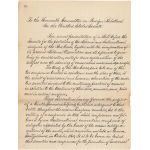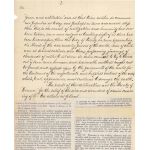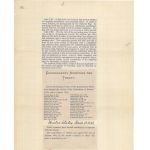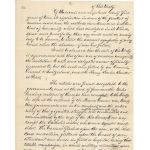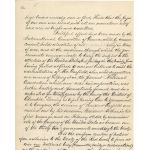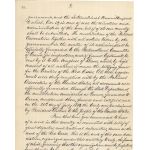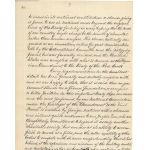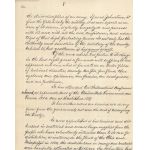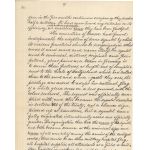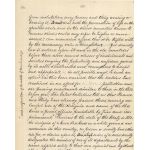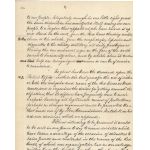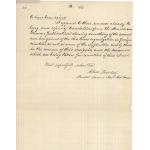Petition to the Senate Regarding the Red Cross from Clara Barton
ca. 1890s
Add to Favorites:
Add all page(s) of this document to activity:
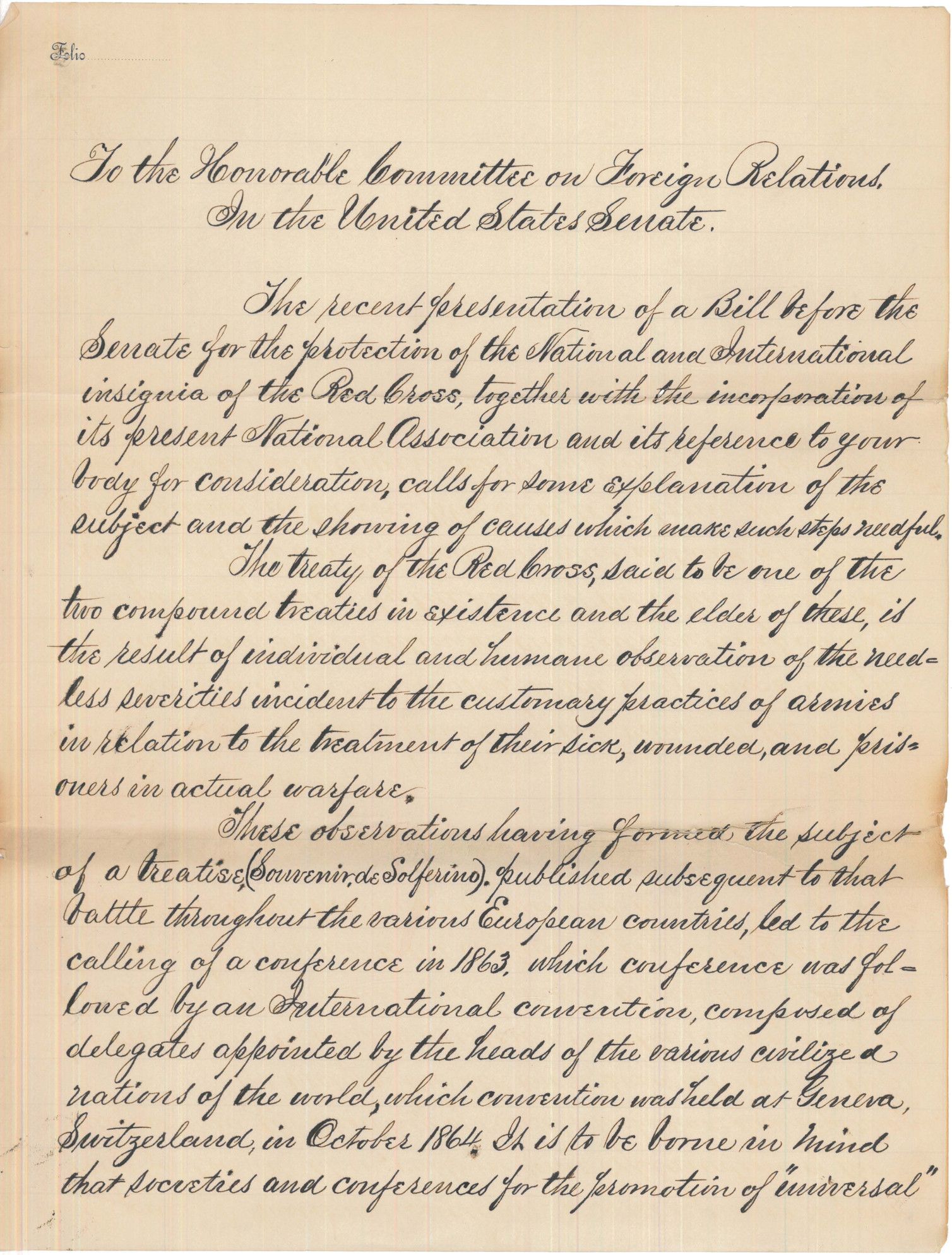
Add only page 1 to activity:
Add only page 2 to activity:
Add only page 3 to activity:
Add only page 4 to activity:
Add only page 5 to activity:
Add only page 6 to activity:
Add only page 7 to activity:
Add only page 8 to activity:
Add only page 9 to activity:
Add only page 10 to activity:
Add only page 11 to activity:
Add only page 12 to activity:
During the late 1890s, several bills were introduced in Congress calling for the incorporation of the American National Red Cross, and for protection of the Red Cross symbol, as required by the Geneva Convention of 1864.
Clara Barton, president of the American Association of the Red Cross, sent this letter to the Senate’s Committee on Foreign Relations supporting a bill "for the protection of the National and International insignia of the Red Cross, together with the incorporation of its National Association." Barton argued that the American Red Cross should be incorporated because its work was necessary in both wartime and natural disasters. Congress granted the American Red Cross a federal charter in 1900. Their legal status is "federal instrumentality," with responsibilities delegated by the Federal Government, including to fulfill the provisions of the Geneva Convention.
Barton attached the articles of the Geneva Convention of 1864 to her letter. In Geneva, Switzerland, in 1864, sixteen countries had established a protocol for the treatment of individuals wounded in armed conflicts. Among the points agreed upon by the representatives in attendance were: aid to the wounded regardless of their nationality, neutrality of medical workers and hospitals, and the presence of a uniform flag at medical facilities with a matching arm-badge to be worn by medical personnel. The flag and badge were to bear the symbol of a red cross on a white background. Over the following decades, additional conventions were held to agree on further provisions regarding the treatment of war victims, including the Geneva Convention of 1949, negotiated after World War II.
While other nations convened in Geneva in 1864, the Civil War raged in the United States. The eventual adoption of the provisions of the Geneva Convention by the United States was in part thanks to the efforts of Barton, who was a Civil War volunteer battlefield nurse. Throughout the war, Barton went to great lengths to ensure that the soldiers she treated had sufficient food, medical supplies, and clothing, and encouraged others to join her aid efforts.
After the Civil War, Barton learned of the International Committee of the Red Cross, an organization that grew out of the Geneva Convention. Understanding its potential benefits to Americans, Barton sought to convince the United States of the importance of the organization and to adopt the principles for which it stood. In 1881, Clara Barton founded the American National Red Cross. One of the association’s first goals was to secure the ratification of the Geneva Convention by the United States, which Congress did in 1882.
This letter from Barton speaks to the importance of the Geneva Convention and its impact both internationally and in the United States. She wrote:
This document was digitized by teachers in our Primarily Teaching 2013 summer workshop in Washington, DC.
Clara Barton, president of the American Association of the Red Cross, sent this letter to the Senate’s Committee on Foreign Relations supporting a bill "for the protection of the National and International insignia of the Red Cross, together with the incorporation of its National Association." Barton argued that the American Red Cross should be incorporated because its work was necessary in both wartime and natural disasters. Congress granted the American Red Cross a federal charter in 1900. Their legal status is "federal instrumentality," with responsibilities delegated by the Federal Government, including to fulfill the provisions of the Geneva Convention.
Barton attached the articles of the Geneva Convention of 1864 to her letter. In Geneva, Switzerland, in 1864, sixteen countries had established a protocol for the treatment of individuals wounded in armed conflicts. Among the points agreed upon by the representatives in attendance were: aid to the wounded regardless of their nationality, neutrality of medical workers and hospitals, and the presence of a uniform flag at medical facilities with a matching arm-badge to be worn by medical personnel. The flag and badge were to bear the symbol of a red cross on a white background. Over the following decades, additional conventions were held to agree on further provisions regarding the treatment of war victims, including the Geneva Convention of 1949, negotiated after World War II.
While other nations convened in Geneva in 1864, the Civil War raged in the United States. The eventual adoption of the provisions of the Geneva Convention by the United States was in part thanks to the efforts of Barton, who was a Civil War volunteer battlefield nurse. Throughout the war, Barton went to great lengths to ensure that the soldiers she treated had sufficient food, medical supplies, and clothing, and encouraged others to join her aid efforts.
After the Civil War, Barton learned of the International Committee of the Red Cross, an organization that grew out of the Geneva Convention. Understanding its potential benefits to Americans, Barton sought to convince the United States of the importance of the organization and to adopt the principles for which it stood. In 1881, Clara Barton founded the American National Red Cross. One of the association’s first goals was to secure the ratification of the Geneva Convention by the United States, which Congress did in 1882.
This letter from Barton speaks to the importance of the Geneva Convention and its impact both internationally and in the United States. She wrote:
[P]erhaps no more advanced step than this, in the march of civilization and humanity had ever been taken, nor a more unique or touching sight of its kind had been looked upon, than this body of twenty six men representing the Heads of the war-making powers of the world . . . performing journeys of thousands of miles to sit down in calm counsel to try to “think out” if some more humane and reasonable methods might not be found, and agreed upon by the governments of the world for the treatment of the unfortunate and helpless victims of the wars.To this day, the United States and nations around the world abide by the agreements made at the Geneva Convention. The American Red Cross and International Committee of the Red Cross continue to provide aid and relief in times of war and disaster and are known around the world by the symbol of the red cross for which they were named.
This document was digitized by teachers in our Primarily Teaching 2013 summer workshop in Washington, DC.
Transcript
To the Honorable Committee on Foreign Relations,In the United States Senate,
The recent presentation of a Bill before the Senate for the protection of the National and International insignia of the Red Cross, together with the incorporation of its present National Association and its reference to your body for consideration, calls for some explanation of the subject and the showing of causes which wake such steps needful.
The treaty of the Red Cross, said to be one of the two compound treaties in existence and the class these, is the result of individual and human observation of the needless severities incident to the customary practices of armies in relation to the treatment of their sick, wounded, and prisoners in actual warfare.
These observations having formed the subject of a treaties, (Souvenir de Solferino) published subsequent to that battle throughout the various European countries, led to the calling of a conference in 1863, which conference was followed by an International conversation, composed of delegates appointed by the heads of the various civilize a nations of the world, which convention was held at Geneva, Switzerland, in October 1864. It is to be borne in mind that societies and conferences for the promotion of "universal"
"peace and arbitration" were at that time neither so common nor popular as today, and perhaps no more advanced step than this, in the march of civilization and humanity had ever been taken, nor a more unique or touching sigh of its kind had been looked upon, than this body of twenty six men representing the Heads of the war making powers of the world . Some of which were at Serious variance ever then performing journeys of thousands of miles to sit down in calm counsel to try to think out "if some more humane, and seasonable methods might not be found, and agreed upon by the governments of the world for the treatment of the unfortunate and helpless victims of the wars, which, to all appearance must continue to scrounge the earth.
The result of this deliberation was the "Treaty of Geneva" for the relief of the sick and wounded of armies " consisting of the ten articles as followed. [Cut out parts of a newspaper] Articles of Convention for the amelioration of the condition of the wounded in armies in the field. Signed at Geneva on the 22d of August, 1864.
ARTICLE I. Ambulances and military hospitals shall be acknowledged to be neutral; and, as such, shall be protected and respected by belligerents so long as any sick or wounded may be therein. Such neutrality shall cease if the ambulances or hospitals shall be held by a military force.
ART. II. Persons employed in hospitals and ambulances, comprising the staff for superintendence, medical service, ad- ministration, transport of wounded, as well as chaplains, shall participate in the benefit of neutrality while so employed, and as long as there remain any wounded to bring in or to succor.
ART. III. The persons designated in the preceding article may, even after occupation by the enemy, continue to fulfill their duties in the hospital or ambulance which they serve, or may withdraw to join the corps to which they belong. under such circumstances, when these persons shall cease from these functions, they shall be delivered by the occupying army to outposts of the enemy. They shall have the special right of sending a representative to headquarters of their respective armies. [Upside down article] army by diplomatic or military means. the contents of this article, so far as they are applicable to the marine, and capable of execution, shall be observed by victorious naval forces. inform the inhabitants of this appeal addressed to their humanity, and of the neutrality which will be the consequence of it. Any wounded man entertained and taken care of in a house shall be considered as a protection thereto. Any inhabitant who shall exempted from the quartering of troops, as well as from the contributions of war which may be imposed.
ART. VI. Wounded or sick soldiers, whatever their nationality, shall be cared for. Commanders-in-chief shall have the power to deliver immediately to outposts of the enemy soldiers who have been wounded in an engagement, when circumstances permit this to be done, with the consent of the both parties. Those who are recognized as incapable of serving, after they healed, shall be sent back to their country. [Sentence is cut off at the end of the page.]
Art. VII. A distinctive and uniform flag shall be adopted for hospitals, ambulances and evacuated places. It must on every occasion, be accompanied by the National flag. An arm-badge shall also be allowed for individuals neutralized , but the delivery of it shall be left to military authority. The flag and arm-badge shall her a red cross on a white ground.
ART. VIII. It is the duty of the conquering army to supervise, as far as circumstances permit, the soldiers who have fallen on the field of battle, to preserve them from pillage and bad treatment, and to bury the dead in conformity with strict sanitary rules. The contracting powers will take care that in time of war every soldier is furnished with a compulsory and uniform token, appropriate for establishing his identity. This token shall indicate his name, place of birth, as well as the army corps regiment and company to which he belongs. In case of death, this document shall be withdrawn before his burial and remitted to the civil or military authorities of the place of enlistment or home. Lists of dead, wounded, sick and prisoners shall be communicated, as far as possible, immediately after an action, to the commander of the opposing army by diplomatic or military means.
The contents of this article, so far as they are applicable to the marine, and capable of execution, shall be observed by victorious naval forces.
GOVERNMENTS ADOPTING THE TREATY.
List in chronological order of the governments which have adopted the articles of Convention of Geneva, of the 22d of August, 1864:
*France, Sept. 22, 1864.
*Belgium, Oct. 14, 1864.
*Italy, Dec. 4, 1864.
*Sweden and Norway, Dec. 13, 1864.
*Baden, Dec. 16, 1864.
Great Britain, Feb. 18, 1865.
*Prussia, June 22, 1865.
*Wurtemberg, June 2, 1866.
Bavaria, June 30, 1866.
*Portugal, Aug. 9, 1866.
Russia, May 22, 1867.
Roumania, Nov. 30, 1874.
San Salvador, Dec. 30, 1874.
Servia, March 21, 1876.
Chili, Nov. 15, 1879.
Peru, April 22, 1880.
[second column]
*Switzerland, Oct. 1, 1864.
*Netherlands, Nov. 29, 1864.
*Spain, Dec. 5, 1864.
*Denmark, Dec. 15, 1864.
Greece, Jan. 17, 1865.
Mecklenburg-Schwerin, Mar. 9, '65.
Turkey, July 5, 1865.
*Hesse Darmstadt, June 22, 1866.
Austria, July 21, 1866.
Saxony, Oct. 25, 1866.
Pontifical States, May, 9, 1868.
Persia, Dec. 5, 1874.
Montenegro, Nov. 29, 1875.
Bolivia, Oct. 16, 1879.
Argentine Republic, Nov. 25, 1879.
United States March 1st 1882
These countries have formed societies to co operate with the Treaty.
The Convention of Geveva was signed the 22d of August, 1864, by the twelve countries of which the Name is preceded by an *.
of this treaty
Of the success and usefulness twenty five years of time, its application in some of the greatest of modern wars, and the methods, inventions, and institutions of humanity which have developed in its tracks speak more powerfully than any words could do, needing only to be known, to elicit the warmest sympathy of every hearts where the shadow of was has fallen.
It will be observed that the date of this treaty is synonymous with that of our was of secession, consequently the invitation to us to send delegates, was not officially responded to but the seats were filled by our Counsel General to Switzerland, and Mr. Henry Bowles, Banker as Paris.
The articles were found acceptable to the governments, and at the end of four months twelve leading nations of Europe had acceded to the treaty. In 1840 at the outbreak of the Franco German was, twenty Three governments were in the compact, and the entire relief of that gigantic struggle was conducted and [inserted] under the regulations of the treaty. [/inserted] administered by the corps of the Red Cross; If one may expect the Catholic sisters, who wore a symbol much older, the "brassard" flashed upon the arm, or the Red Cross medallion glittered upon the break of every attendant and were in field or hospital during that terrible campaign, in which military atrocities were [Sentence is cut off by the page]
siege lacked nursing, care, or good. Would that the payed of our own war record, with all our marvellous [sic] relief work were as bright and unsullied.
Faithful efforts had been made by the International Committee of Geneva which by common consent, holds direction of all word gone relief in time of war, and is the medicine through which the governments communicate to bring the subject to the attention of the United States; but failure in this mainly from having failed at first. it was not listened to until the administration of Mr. Garfield, where at his suggestion, as a means of helping it on, the present National Association which now asks reincorporation, was rather hastily and prematurely formed and incorporated for twenty years by the laws of the District of Columbia. Leaving us before having time to recommend it to Congress, this decision of President Garfield was carried out by his successor, President Arthur, in his first message, and on February 1st, 1882, by unanimous vote of the Congress of the United States we became one of the thirty two governments acceding to the treaty.
It is the uniform custom of nations Upon adhesion to the treaty of the Red Cross, to form at once one national body, (Committee, society, or association)
[Sentence ends by the page being cut off.]
government, and the International Committee, and to which, like it in case of was the direction and administration of the was relief of its own country shall be submitted. The constitution of this National Association together with all action taken by the government in the matter of its adhesion shall be officially forwarded to the International Committee of Geneva, for inspection, and if found legitimate be sent by it to the Congress of Berne, which by high consent of all nations, is made the ratifying power for the treaties of the Red Cross. All these requirements were duly complied with by the National Association of the United States, all documents were officially forwarded through the State Department, the constitution considered at Geneva, forwarded to Berne, considered there, passed are ratified and on the 26d day of July 1882 the treaty was proclaimed by President Arthur to the people of the United States.
From that time you commenced to hear of a work in this country as connected with relief of great disasters, and national calamities, known as the work of the Red Cross. This is the work of this same association, organized under this military treaty, the framers of which, foreseeing that this organization must be perpetual
[Sentence is cut off by the page]
to insert in its national constitution a clause giving it power to act in national needs beyond the original lives of the treaty for relief in war; hoping that the needs of our country might always be the results of elemental rather than human warfare. This clause, naturally regarded as an innovation, called for great consideration both by the International Committee and the Ratifying powers, but was favorably decided, and the United States was accepted with what is known as the "American Amendment to the treaty of the Red Cross."
Every requirement, even in the smallest detail has been formally and suitably complied with, and we are happy to state, that it is said that no government stands on a firmer foundation, or occupies a better position in this important treaty than our own: and the work performed by our National Association under the privileges of the "Amendment" or the "civil Branch" is watched by foreign nations with a closeness and interest quite unknown to our people here, who are thoughtlessly accustomed to regard it as only another "charitable society," but wonder at its ability to accomplish so much at a field, and the utter inability of other bodies to compete with it; never comprehending that it has behind it the experience and wisdom of the military world and maintained so far as practicable upon entering a field
the strict discipline of an army. If as at Johnstown, it find the field held by the military, it at once reports as an arm of its service, is gladly recognized and proceeds with its work, with all the aid, confidence, and advantages of that high protecting power; It not only has the authority and sanction of the military of the country behind it, but gentlemen it has yours as well.
Of the work which has fallen to its charge in the last eight years a few words will suffice; It has appeared and done what it found to do on twelve fields of national disasters, namely one fire, four floods, three cyclones, one epidemic, one famine, one earthquake, and one pestilence.
It has attended two International Conferences abroad, as representatives of the United States Government, one Geneva, 1884, one at Carlsruhe, 1887.
It has neither asked nor received aid in any form from the government; not even the cost of arrangeing [sic] the treaty.
It never appeals: but it has received and disburssed [sic] in material and means large supplies from the people who have voluntarily intrusted them to its care for distribution; as instances,-in the floods of the Ohio and Mississippi in 1884, the distributions in money and material were carefully estimated at $175.000. In Johnstown last
year, in the five months continuous occupancy they reached half a million. We have never heard any criticism on its or its methods of distribution efficiency,^ we ourselves know they have been faithful.
The convention of Geneva had found indispensable the adoption of some symbol by which its various functions should be recognized in other words, it must mark and name itself. The symbol must be universal, distinct, original and perpetual; great pains were taken in forming it to secure these features, at length out of compliment to the State of Switzerland which had called them to the work and whose guests they were, the privilege was asked to adopt her national flag of a white greek cross on a red ground, with the colors reversed. The request was officially complied with, and this became the symbol described in section VII. of the treaty, not a chance sign, picked up at random, but a symbol carefully originated, internationally asked and officially granted. The organization then took the name of the symbol, and both became known as the universal sign and name of all war relief among the armies of the civilized world; these could be no other military hospital flag, all hospital supplies, all attendants at a field or military hospital must be[?] [runs off page]
grow molestation, every person and thing wearing or bearing it. It must deal with the preservation of life on the greatest scale, and in the direst necessities known to human kind; could any sign be higher or more sacred? Can mankind afford that it be trifled with by the mercenary, vain or thoughtless, and[?] yet scarcely had it entered upon its work in the old countries before these above named classes of individuals and societies envying the popularity and confidence gained by its noble disinterested work, commenced to adopt and appropriate it[?], in all possible ways, to such an extent has this been carried that the nations have combined in an effort for national[?] protection and are passing enactments similar to those in the Bill before you, The latest bulletins tell us that France and Italy have already passed theirs, making unlawful use of the insignia and name of the Red Cross a penal offence punishable by fine and imprisonment,+ Previous to the date of the Treaty in 1882, the insignia of a Greek Red Cross on a white ground was unknown in this country, no person or society had either use for, or claim upon it, True a high order of a secret society designated the members of one of its departments by the name, applied solely to their own especial and legitimate
[runs off page]
[left margin-] + and confiscation of the article of merchandize
to our people. Singularly enough in our little eight years the same disposition has manifested itself among our own people, to a degree that appalls us, who have raised it up and stand in the work, from the Red Cross threshing machine, ^washboard^ to the churn or tin whistle, from the cough drops, lip salve and ciggarettes [sic] to the whisky distillery, all daily pass before us bearing the one universal sign on the face of the earth sacred to humanity alone, and by which alone its workers and their help are recognized and known or can be of service to mankind.
So great has been the demand upon the U.S. Patent Office within the last years for the use of either or both the insignia and name of the Red Cross as trade marks, and so ingenious the devices for "getting around" the objections, that its officers have frequently come to us in despair, lacking all legitimate means of protection: perhaps no stronger argument could be presented than that made use of by Hon. Commissioner Mitchell in his adverse decision which we append.
Without intending to be personal it would be be well in our power today to name societies which have taken advantage of the occasion of disasters to raise funds and material in the name of the Red Cross, of which our organization had no knowledge. neither had the[?] [runs off page]
to have been raised
I append to these remarks already too long, some copies of translations from the French and German publications showing something of the resources and how gained of the Red Cross organization in foreign countries, as well as some of the difficulties met by them in the misuse of their insignia, and the measures which are being taken for correction of these abuses.
Most respectfully Submitted
Clara Barton
President American Natl Red Cross
This primary source comes from the Records of the U.S. Senate.
National Archives Identifier: 7542783
Full Citation: Petition to the Senate Regarding the Incorporation of the Red Cross from Clara Barton ; ca. 1890s; (SEN 51A-F12); Committee Papers, 1817 - 2011; Records of the U.S. Senate, Record Group 46; National Archives Building, Washington, DC. [Online Version, https://docsteach.org/documents/document/petition-senate-regarding-red-cross-clara-barton, April 20, 2024]Rights: Public Domain, Free of Known Copyright Restrictions. Learn more on our privacy and legal page.



